Examining the Books
of Kings & Chronicles – 1
Mike Ervin
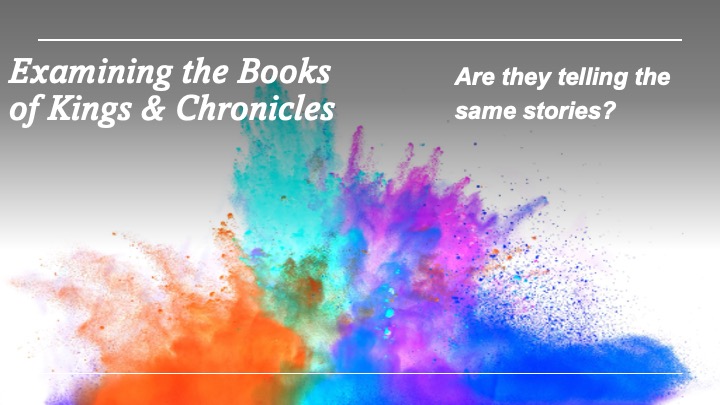
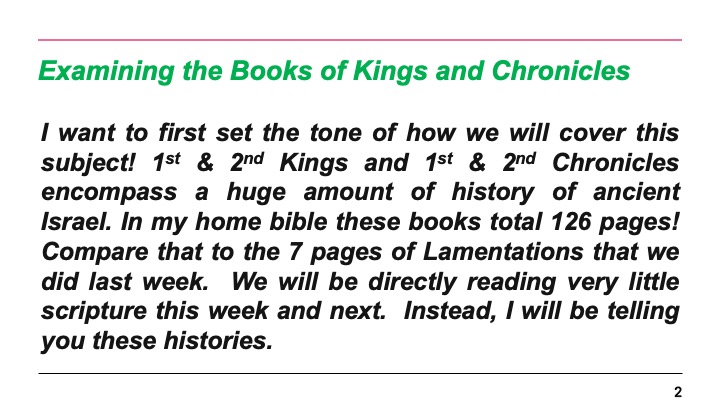
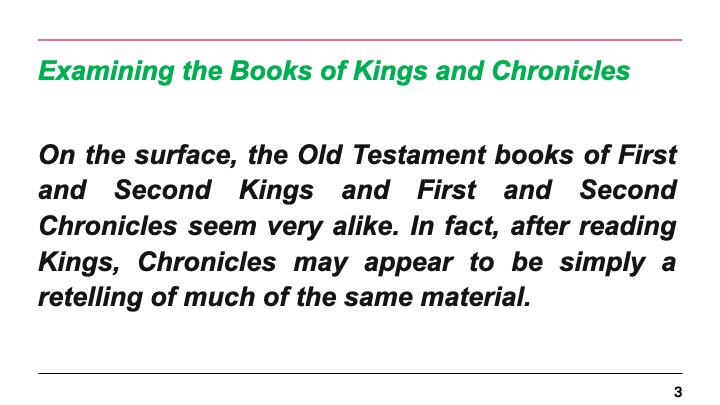
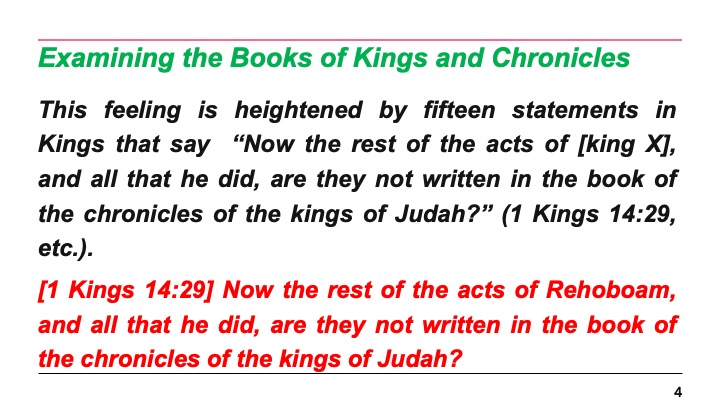
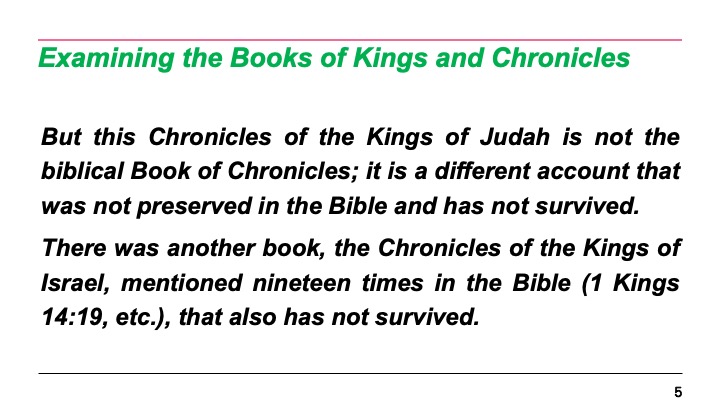
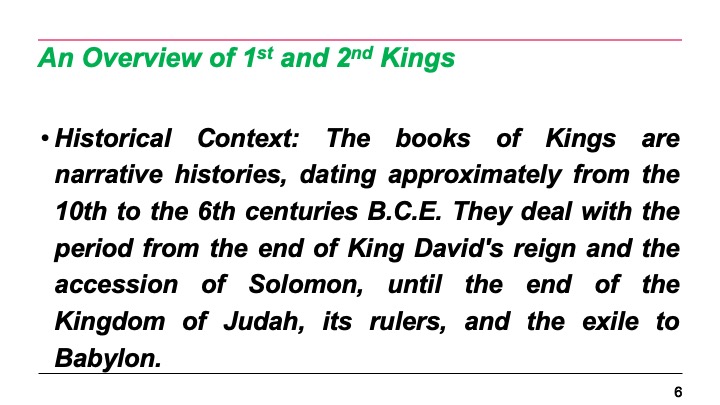
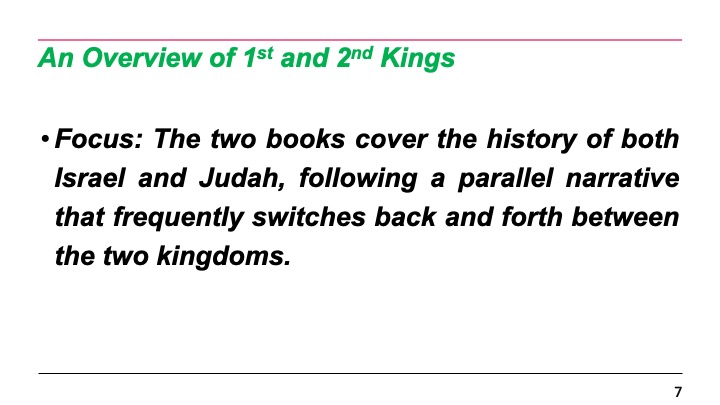
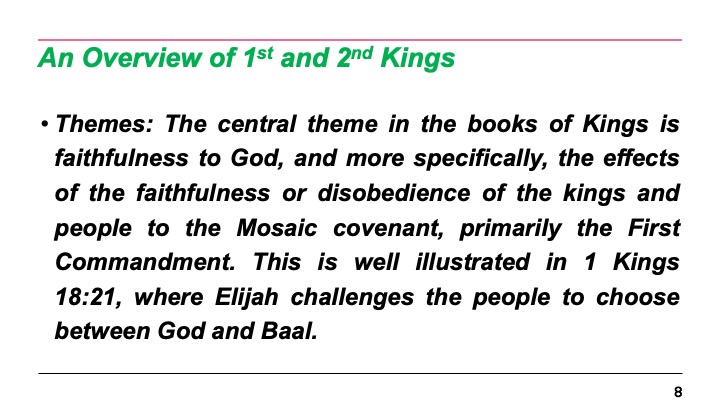
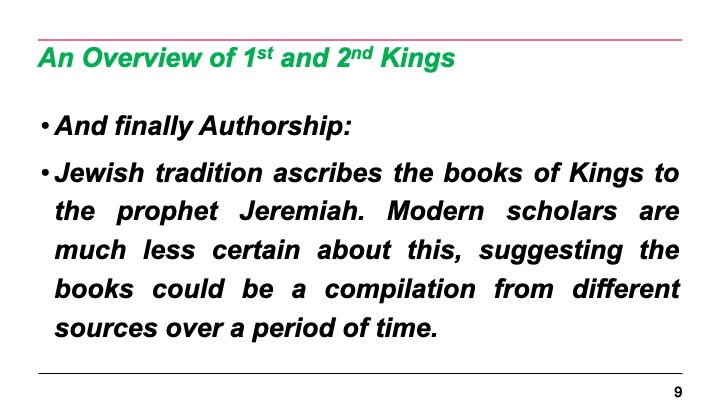
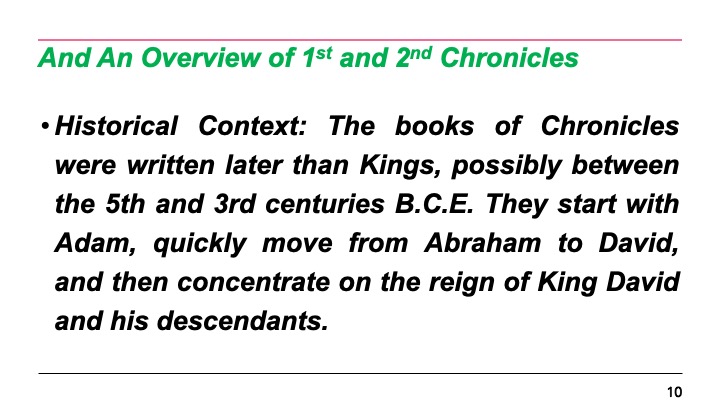
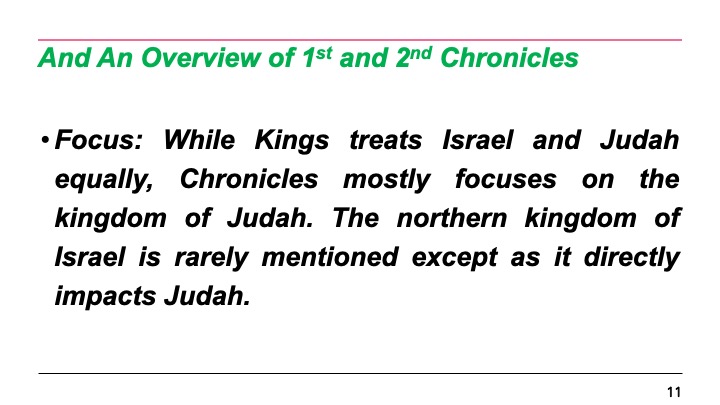
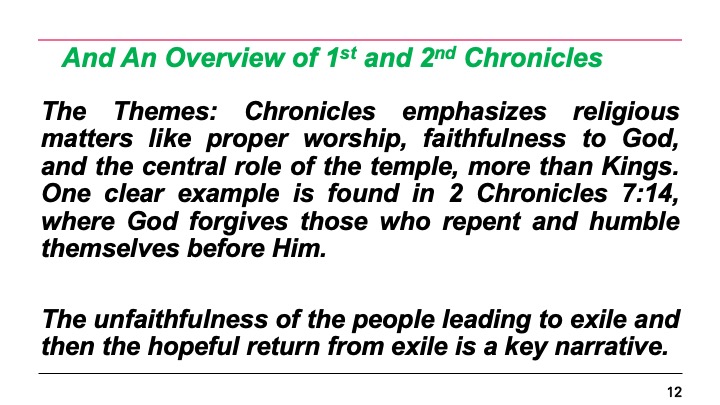
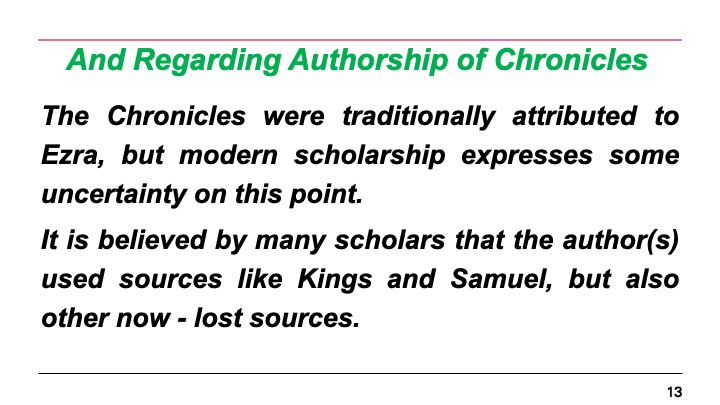
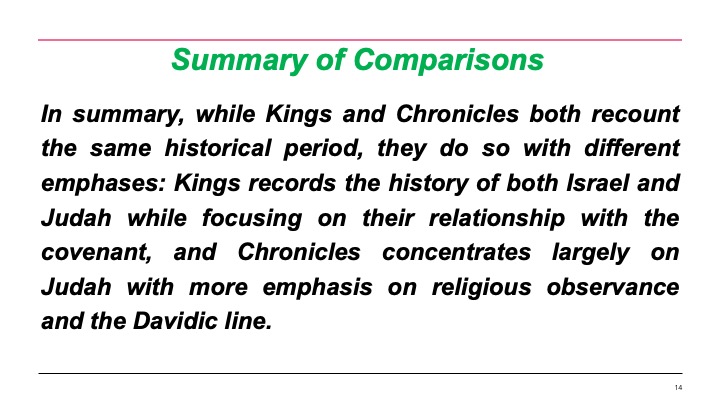
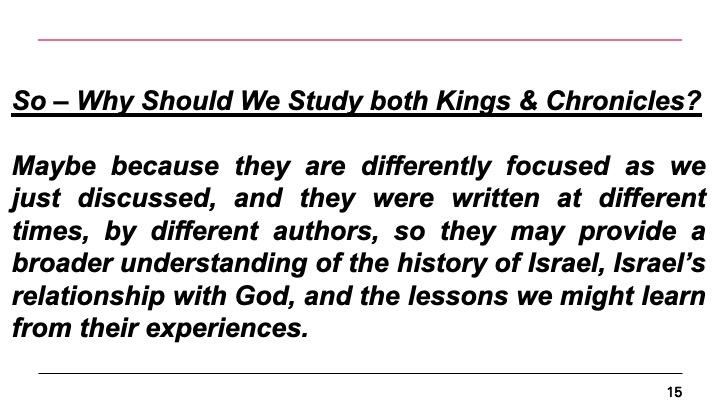
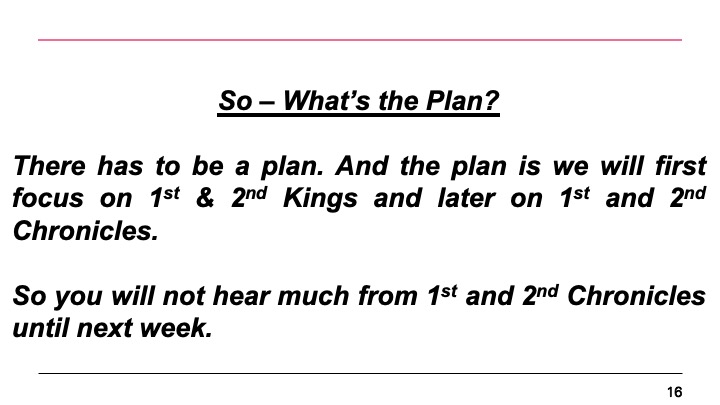
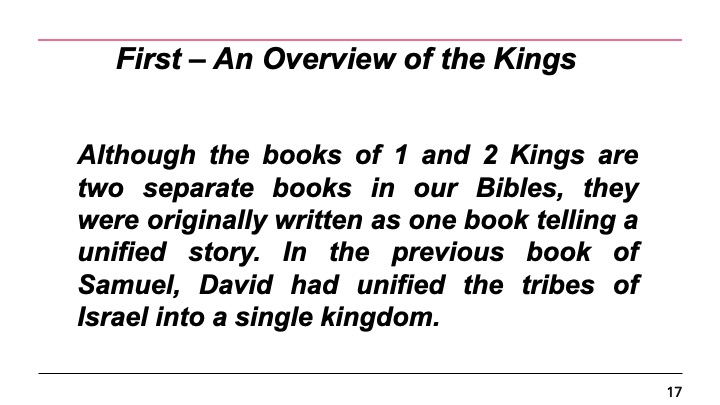
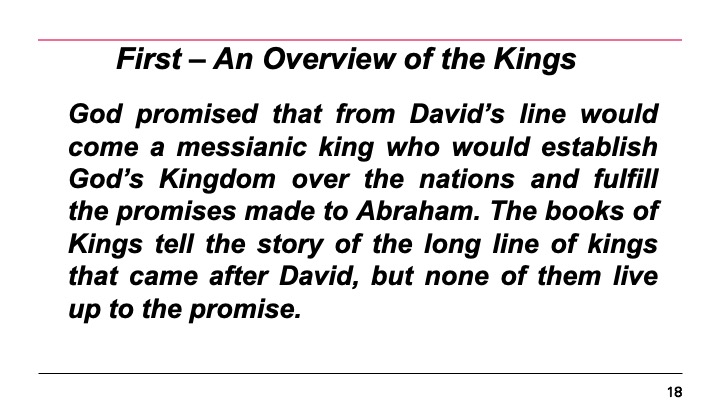
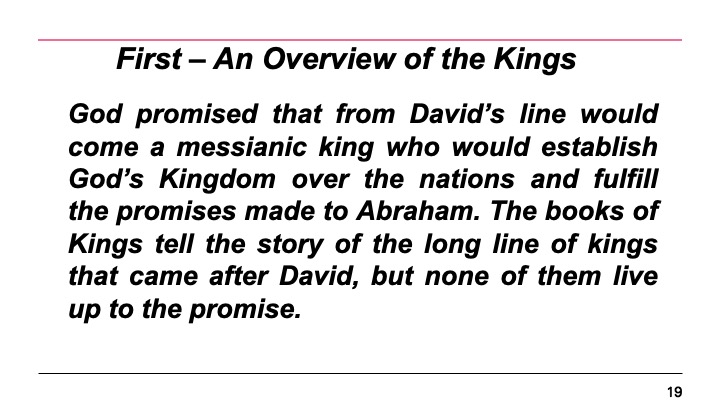

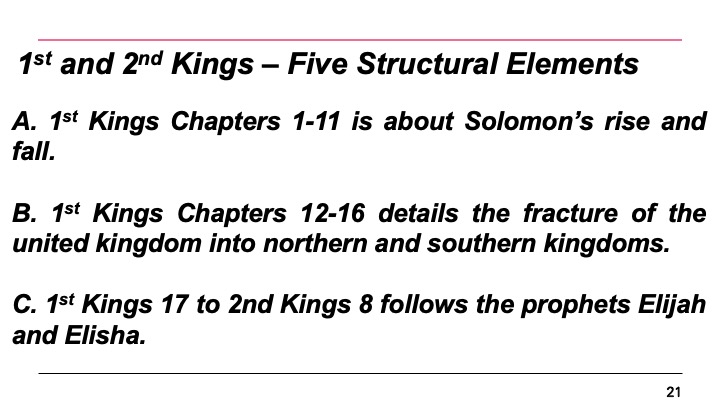
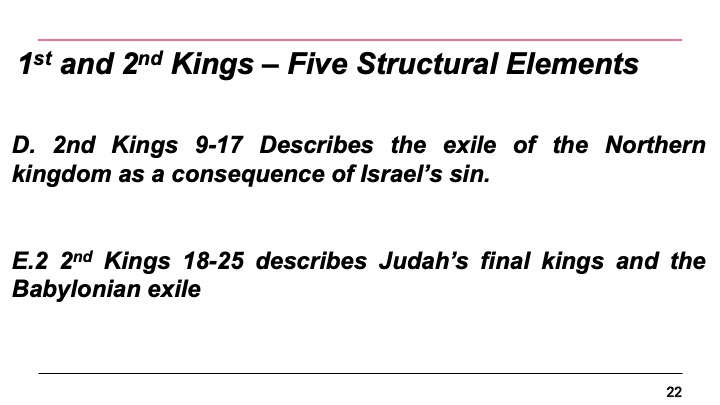
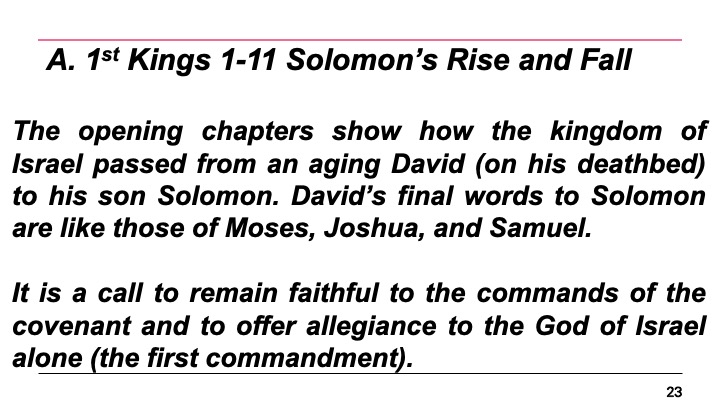
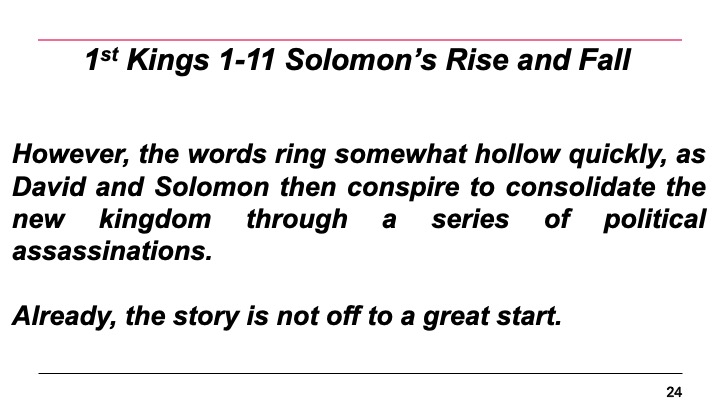
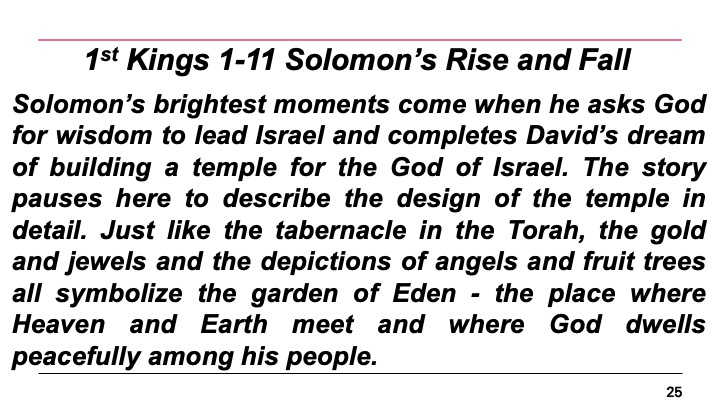

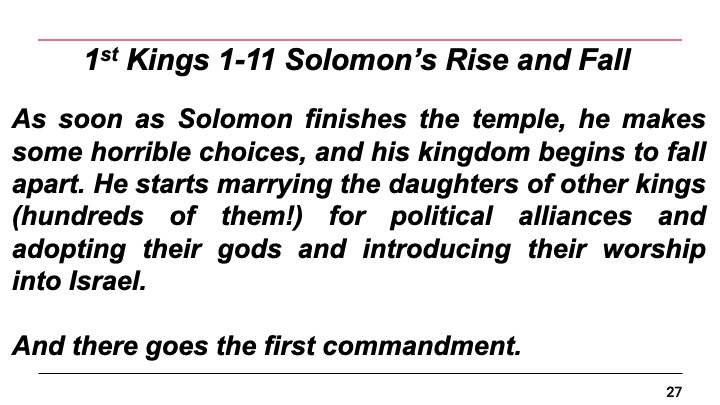
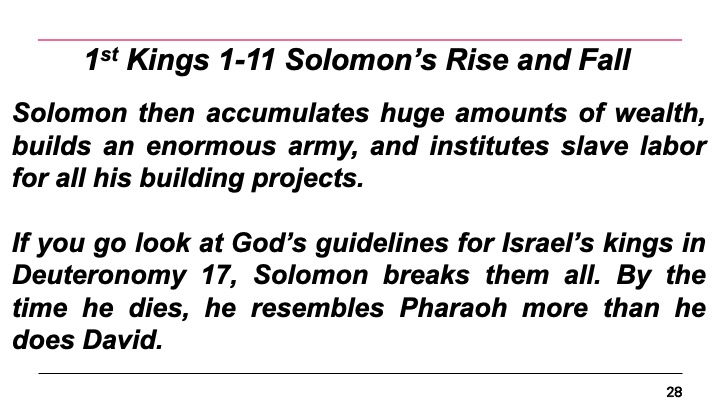
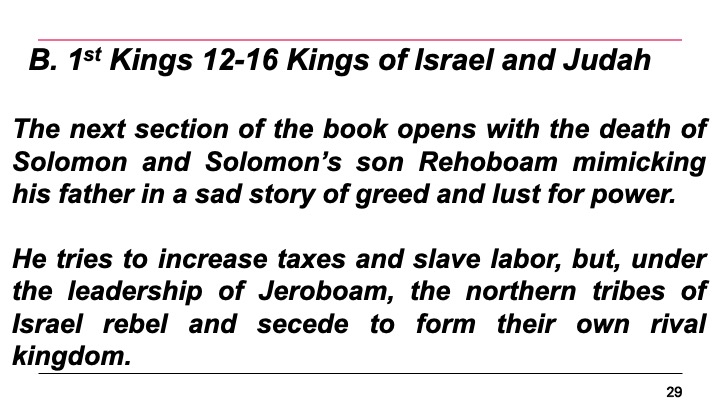

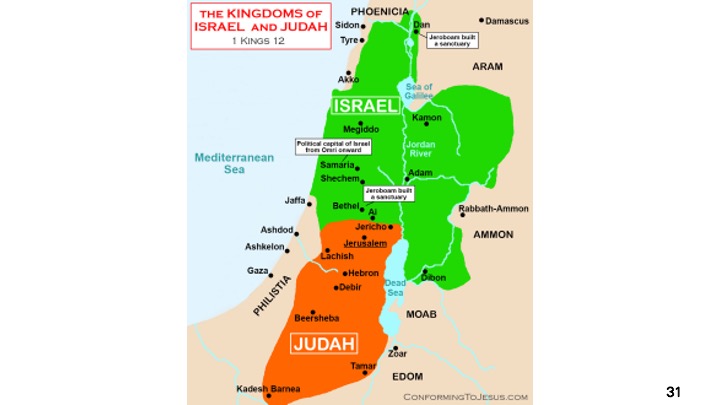
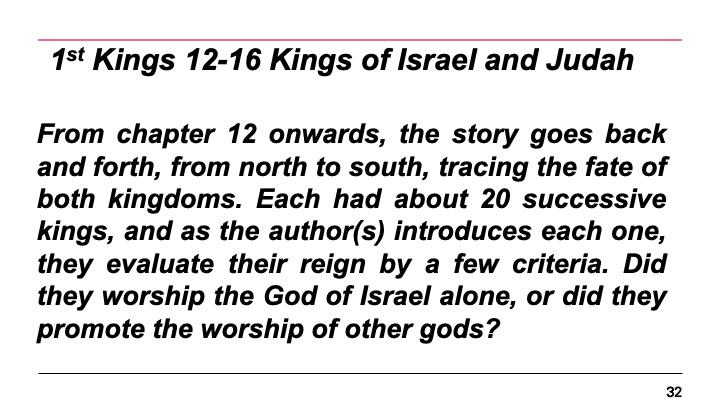
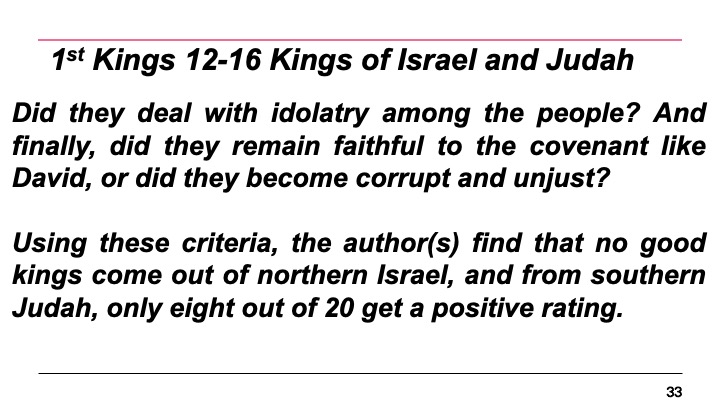
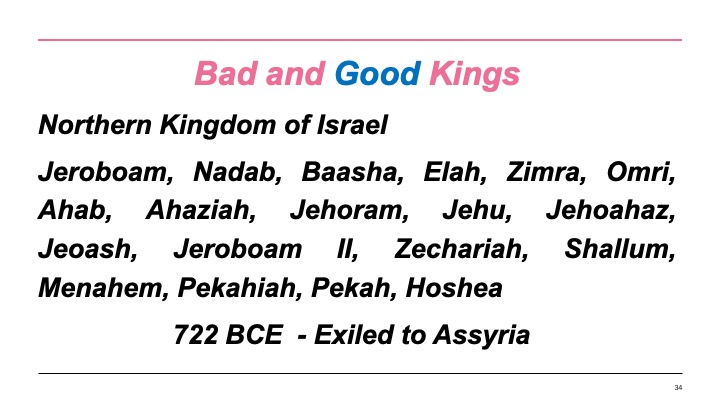

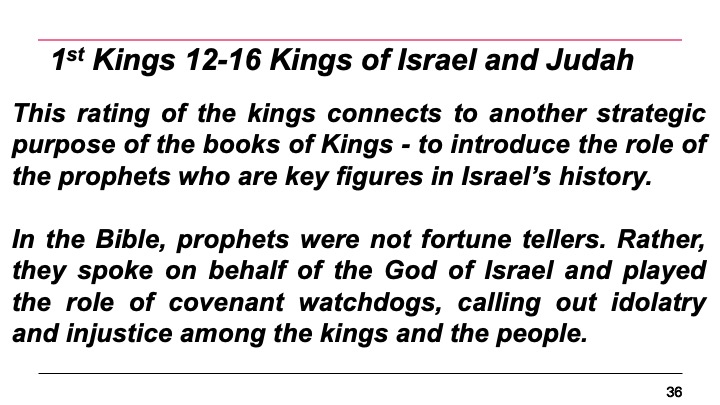
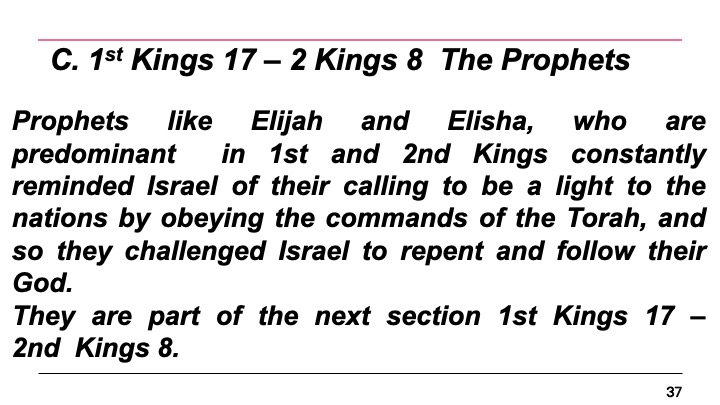
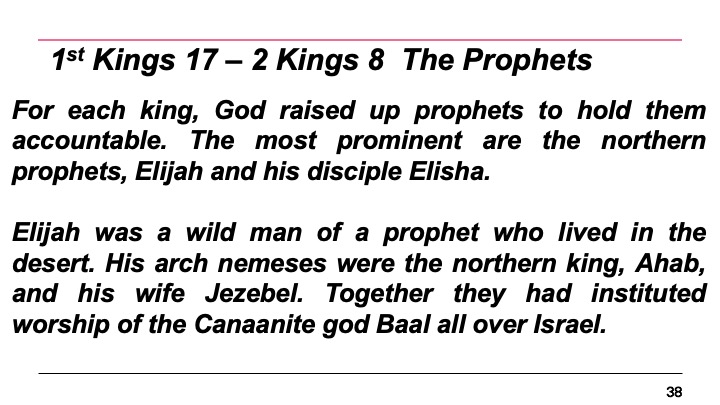
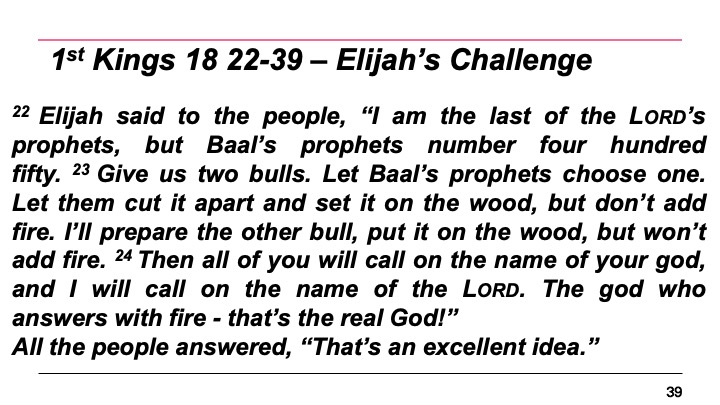
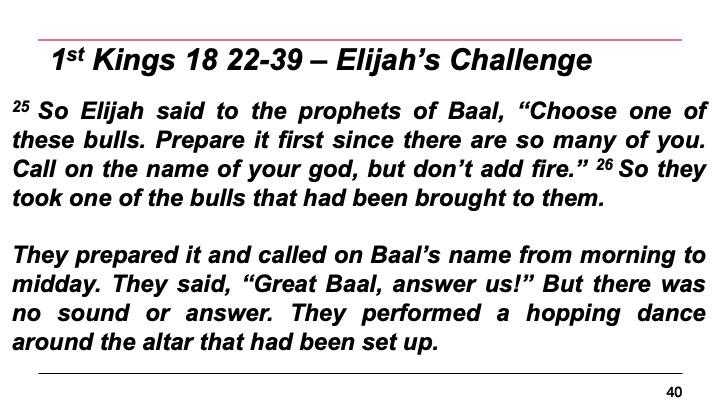
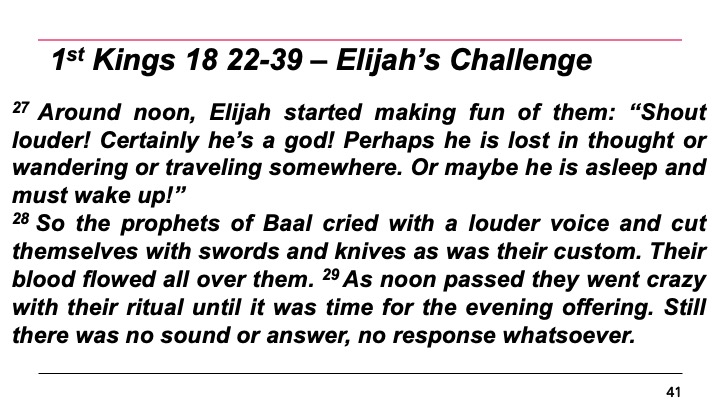
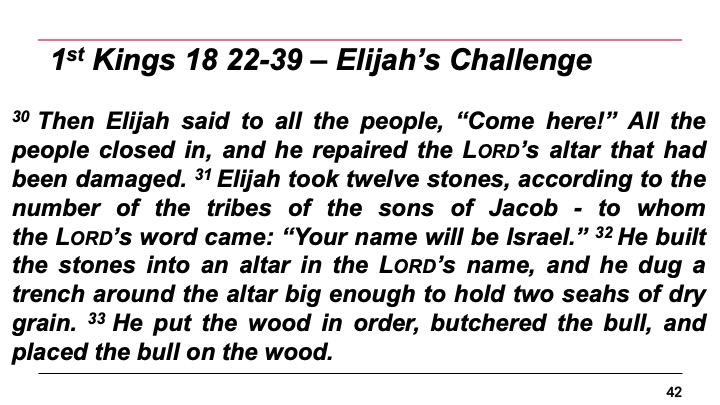
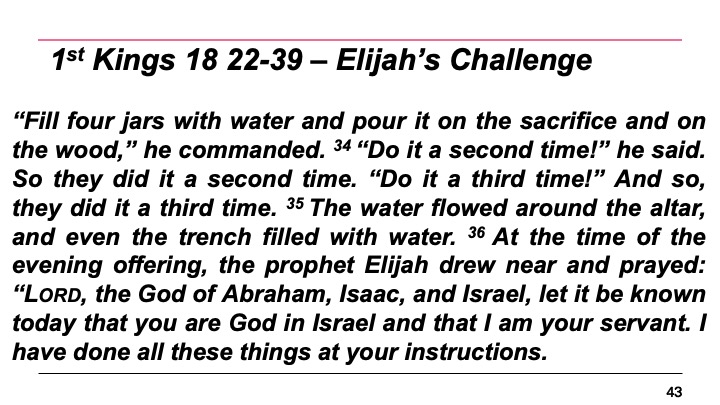
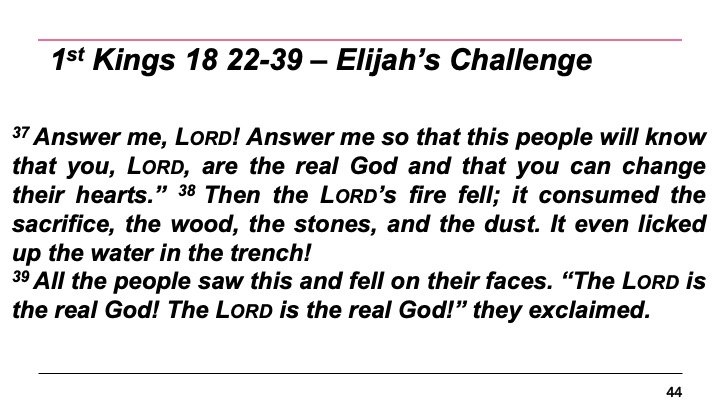
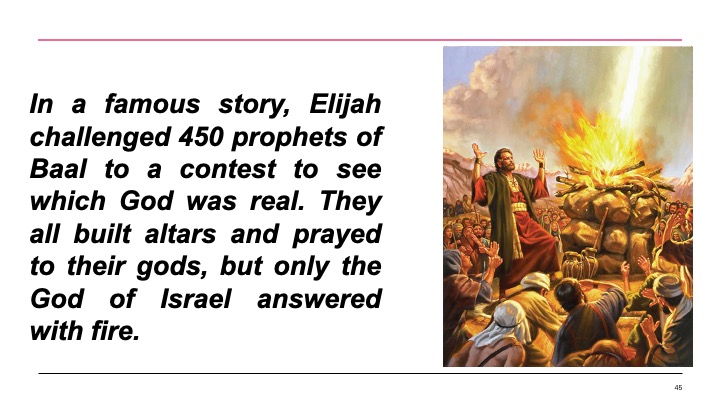
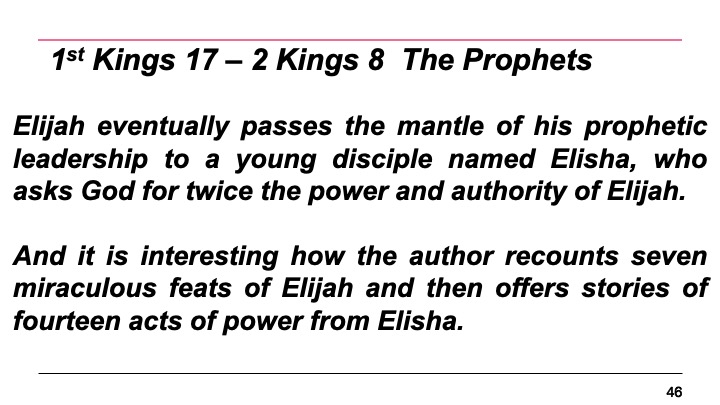
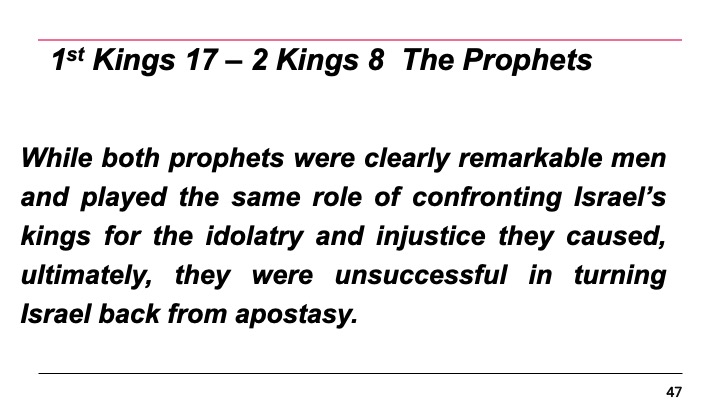
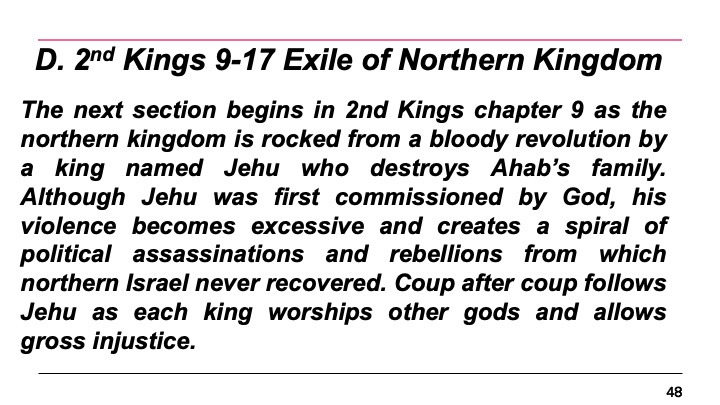

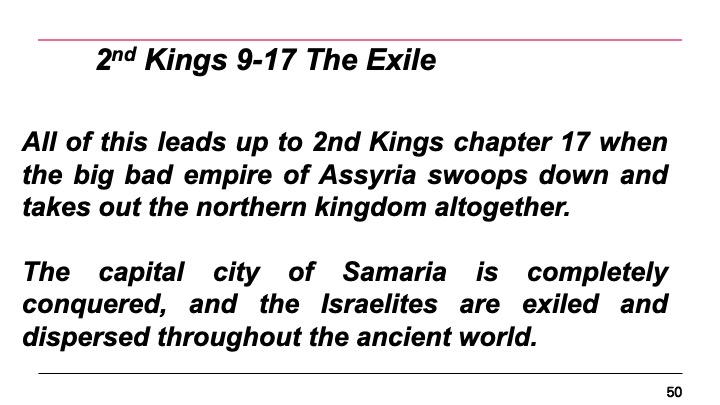
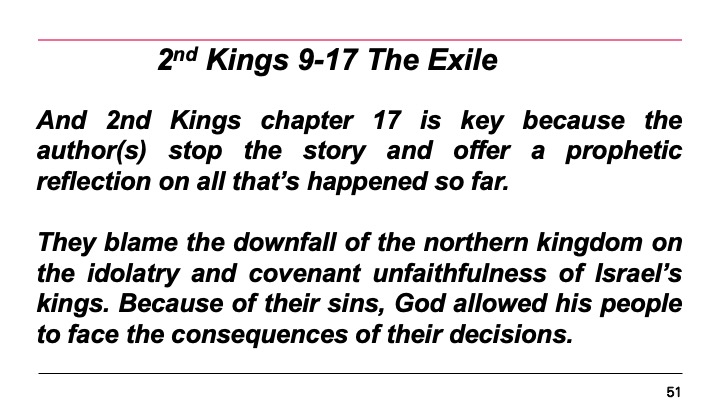
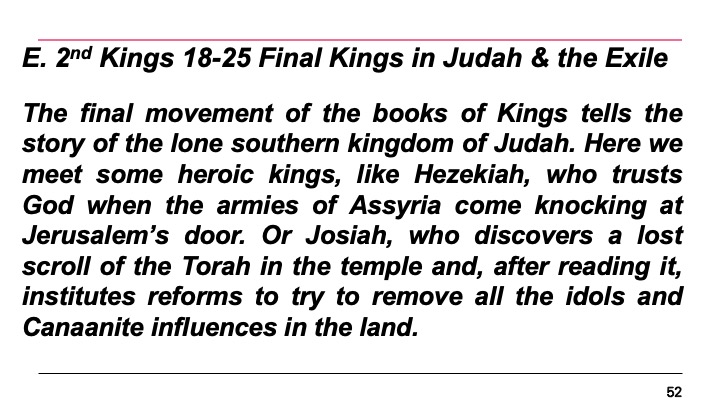
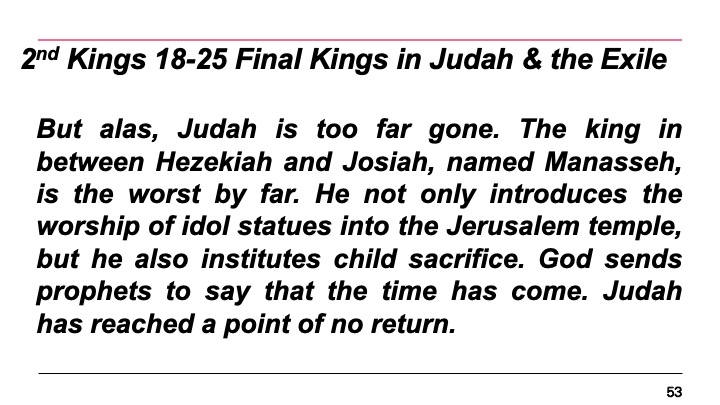
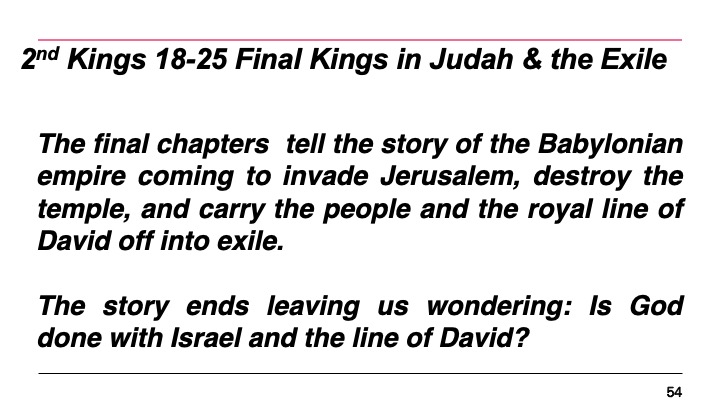
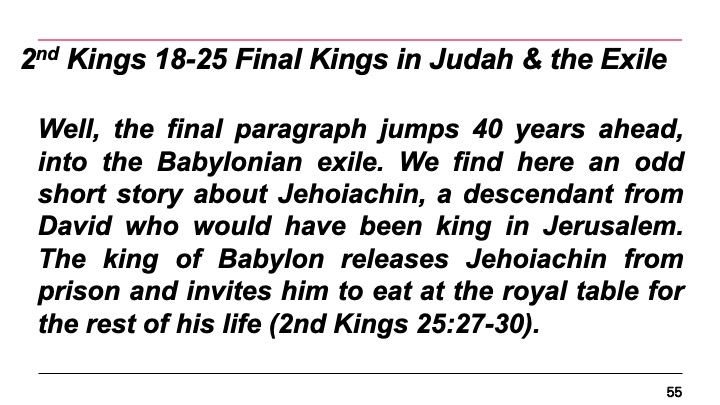
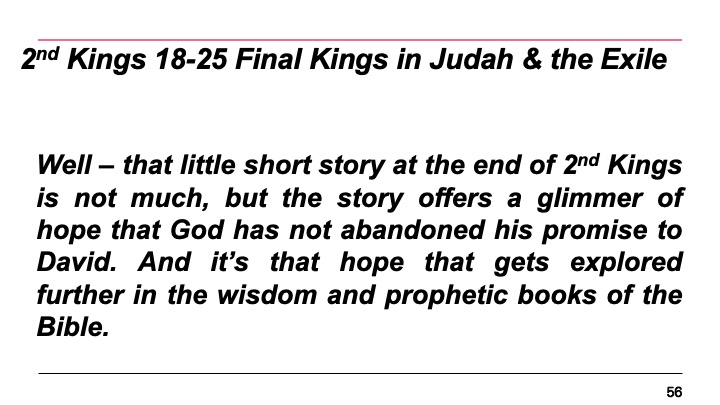
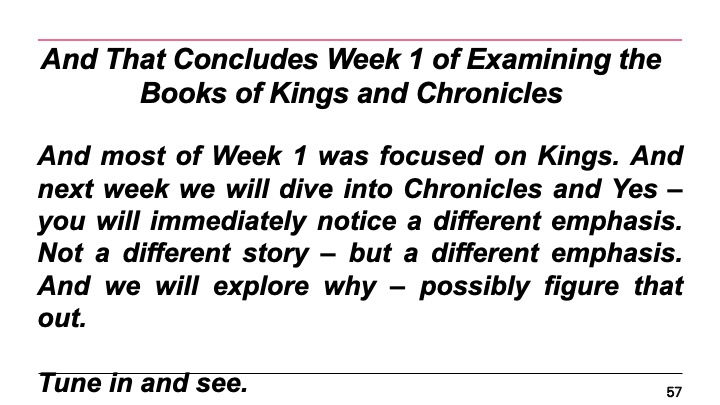
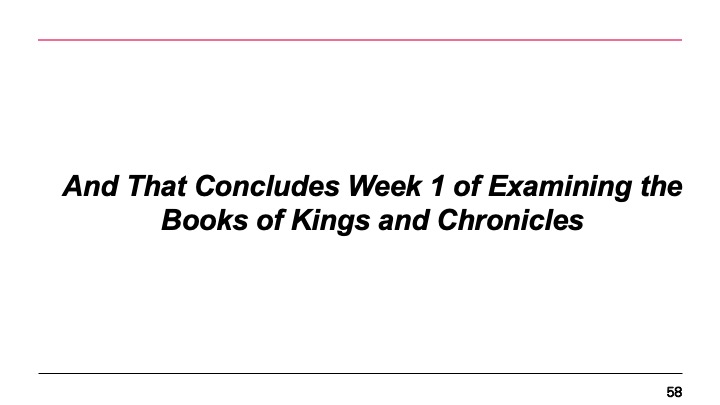
Examining the Books of Kings & Chronicles –1 The text
Examining the Books of Kings & Chronicles – 1
Are they telling the same stories?
I want to first set the tone of how we will cover this subject! 1st & 2nd Kings and 1st & 2nd Chronicles encompass a huge amount of history of ancient Israel. In my home bible these books total 126 pages! Compare that to the 7 pages of Lamentations that we did last week. We will be directly reading very little scripture this week and next. Instead, I will be telling you these histories.
On the surface, the Old Testament books of First and Second Kings and First and Second Chronicles seem very alike. In fact, after reading Kings, Chronicles may appear to be simply a retelling of much of the same material.
This feeling is heightened by fifteen statements in Kings that say “Now the rest of the acts of [king X], and all that he did, are they not written in the book of the chronicles of the kings of Judah?” (1 Kings 14:29, etc.).
[1 Kings 14:29] Now the rest of the acts of Rehoboam, and all that he did, are they not written in the book of the chronicles of the kings of Judah?
But this Chronicles of the Kings of Judah is not the biblical Book of Chronicles; it is a different account that was not preserved in the Bible and has not survived.
There was another book, the Chronicles of the Kings of Israel, mentioned nineteen times in the Bible (1 Kings 14:19, etc.), that also has not survived.
An Overview of 1st and 2nd Kings
• Historical Context: The books of Kings are narrative histories, dating approximately from the 10th to the 6th centuries B.C.E. They deal with the period from the end of King David's reign and the accession of Solomon, until the end of the Kingdom of Judah, its rulers, and the exile to Babylon.
• Focus: The two books cover the history of both Israel and Judah, following a parallel narrative that frequently switches back and forth between the two kingdoms.
• Themes: The central theme in the books of Kings is faithfulness to God, and more specifically, the effects of the faithfulness or disobedience of the kings and people to the Mosaic covenant, primarily the First Commandment. This is well illustrated in 1 Kings 18:21, where Elijah challenges the people to choose between God and Baal.
• And finally Authorship:
• Jewish tradition ascribes the books of Kings to the prophet Jeremiah. Modern scholars are much less certain about this, suggesting the books could be a compilation from different sources over a period of time.
And An Overview of 1st and 2nd Chronicles
• Historical Context: The books of Chronicles were written later than Kings, possibly between the 5th and 3rd centuries B.C.E. They start with Adam, quickly move from Abraham to David, and then concentrate on the reign of King David and his descendants.
• Focus: While Kings treats Israel and Judah equally, Chronicles mostly focuses on the kingdom of Judah. The northern kingdom of Israel is rarely mentioned except as it directly impacts Judah.
• The Themes: Chronicles emphasizes religious matters like proper worship, faithfulness to God, and the central role of the temple, more than Kings. One clear example is found in 2 Chronicles 7:14, where God forgives those who repent and humble themselves before Him.
• The unfaithfulness of the people leading to exile and then the hopeful return from exile is a key narrative.
And Regarding Authorship of Chronicles
The Chronicles were traditionally attributed to Ezra, but modern scholarship expresses some uncertainty on this point.
It is believed by many scholars that the author(s) used sources like Kings and Samuel, but also other now - lost sources.
Summary of Comparisons
In summary, while Kings and Chronicles both recount the same historical period, they do so with different emphases: Kings records the history of both Israel and Judah while focusing on their relationship with the covenant, and Chronicles concentrates largely on Judah with more emphasis on religious observance and the Davidic line.
So – Why Should We Study both Kings & Chronicles?
Maybe because they are differently focused as we just discussed, and they were written at different times, by different authors, so they may provide a broader understanding of the history of Israel, Israel’s relationship with God, and the lessons we might learn from their experiences.
So – What’s the Plan?
So – What’s the Plan?
There has to be a plan. And the plan is we will first focus on 1st & 2nd Kings and later on 1st and 2nd Chronicles.
So you will not hear much from 1st and 2nd Chronicles until next week.
First – An Overview of the Kings
Although the books of 1 and 2 Kings are two separate books in our Bibles, they were originally written as one book telling a unified story. In the previous book of Samuel, David had unified the tribes of Israel into a single kingdom.
God promised that from David’s line would come a messianic king who would establish God’s Kingdom over the nations and fulfill the promises made to Abraham. The books of Kings tell the story of the long line of kings that came after David, but none of them live up to the promise.
First – The Structure of the Kings
And it is important to point out that like a good history book Kings is clearly structured to tell the story in a structured manner.
There are five structural elements to the history .
1st and 2nd Kings – Five Structural Elements
A. 1st Kings Chapters 1-11 is about Solomon’s rise and fall.
B. 1st Kings Chapters 12-16 details the fracture of the united kingdom into northern and southern kingdoms.
C. 1st Kings 17 to 2nd Kings 8 follows the prophets Elijah and Elisha.
D. 2nd Kings 9-17 Describes the exile of the Northern kingdom as a consequence of Israel’s sin.
E. 2nd Kings 18-25 describes Judah’s final kings and the Babylonian exile
A. 1st Kings 1-11 Solomon’s Rise and Fall
The opening chapters show how the kingdom of Israel passed from an aging David (on his deathbed) to his son Solomon. David’s final words to Solomon are like those of Moses, Joshua, and Samuel.
It is a call to remain faithful to the commands of the covenant and to offer allegiance to the God of Israel alone (the first commandment).
However, the words ring somewhat hollow quickly, as David and Solomon then conspire to consolidate the new kingdom through a series of political assassinations.
Already, the story is not off to a great start.
Solomon’s brightest moments come when he asks God for wisdom to lead Israel and completes David’s dream of building a temple for the God of Israel. The story pauses here to describe the design of the temple in detail. Just like the tabernacle in the Torah, the gold and jewels and the depictions of angels and fruit trees all symbolize the garden of Eden - the place where Heaven and Earth meet and where God dwells peacefully among his people.
As soon as Solomon finishes the temple, he makes some horrible choices, and his kingdom begins to fall apart. He starts marrying the daughters of other kings (hundreds of them!) for political alliances and adopting their gods and introducing their worship into Israel.
And there goes the first commandment.
Solomon then accumulates huge amounts of wealth, builds an enormous army, and institutes slave labor for all his building projects.
If you go look at God’s guidelines for Israel’s kings in Deuteronomy 17, Solomon breaks them all. By the time he dies, he resembles Pharaoh more than he does David.
B. 1st Kings 12-16 Kings of Israel and Judah
The next section of the book opens with the death of Solomon and Solomon’s son Rehoboam mimicking his father in a sad story of greed and lust for power.
He tries to increase taxes and slave labor, but, under the leadership of Jeroboam, the northern tribes of Israel rebel and secede to form their own rival kingdom.
We are left with southern Judah, centered in Jerusalem with kings from the line of David, and this new northern kingdom, called Israel, whose eventual capital will be Samaria.
Jeroboam also builds two new temples to compete with the one Solomon built, and he places a golden calf in each to represent the God of Israel.
From chapter 12 onwards, the story goes back and forth, from north to south, tracing the fate of both kingdoms. Each had about 20 successive kings, and as the author(s) introduces each one, they evaluate their reign by a few criteria. Did they worship the God of Israel alone, or did they promote the worship of other gods?
Did they deal with idolatry among the people? And finally, did they remain faithful to the covenant like David, or did they become corrupt and unjust?
Using these criteria, the author(s) find that no good kings come out of northern Israel, and from southern Judah, only eight out of 20 get a positive rating.
This rating of the kings connects to another strategic purpose of the books of Kings - to introduce the role of the prophets who are key figures in Israel’s history.
In the Bible, prophets were not fortune tellers. Rather, they spoke on behalf of the God of Israel and played the role of covenant watchdogs, calling out idolatry and injustice among the kings and the people.
C. 1st Kings 17 – 2 Kings 8 The Prophets
Prophets like Elijah and Elisha, who are predominant in 1st and 2nd Kings constantly reminded Israel of their calling to be a light to the nations by obeying the commands of the Torah, and so they challenged Israel to repent and follow their God.
They are part of the next section 1st Kings 17 – 2nd Kings 8.
For each king, God raised up prophets to hold them accountable. The most prominent are the northern prophets, Elijah and his disciple Elisha.
Elijah was a wild man of a prophet who lived in the desert. His arch nemeses were the northern king, Ahab, and his wife Jezebel. Together they had instituted worship of the Canaanite god Baal all over Israel.
1st Kings 18 22-39 – Elijah’s Challenge
22 Elijah said to the people, “I am the last of the Lord’s prophets, but Baal’s prophets number four hundred fifty. 23 Give us two bulls. Let Baal’s prophets choose one. Let them cut it apart and set it on the wood, but don’t add fire. I’ll prepare the other bull, put it on the wood, but won’t add fire. 24 Then all of you will call on the name of your god, and I will call on the name of the Lord. The god who answers with fire - that’s the real God!”
All the people answered, “That’s an excellent idea.”
25 So Elijah said to the prophets of Baal, “Choose one of these bulls. Prepare it first since there are so many of you. Call on the name of your god, but don’t add fire.” 26 So they took one of the bulls that had been brought to them.
They prepared it and called on Baal’s name from morning to midday. They said, “Great Baal, answer us!” But there was no sound or answer. They performed a hopping dance around the altar that had been set up.
27 Around noon, Elijah started making fun of them: “Shout louder! Certainly he’s a god! Perhaps he is lost in thought or wandering or traveling somewhere. Or maybe he is asleep and must wake up!”
28 So the prophets of Baal cried with a louder voice and cut themselves with swords and knives as was their custom. Their blood flowed all over them. 29 As noon passed they went crazy with their ritual until it was time for the evening offering. Still there was no sound or answer, no response whatsoever.
30 Then Elijah said to all the people, “Come here!” All the people closed in, and he repaired the Lord’s altar that had been damaged. 31 Elijah took twelve stones, according to the number of the tribes of the sons of Jacob - to whom the Lord’s word came: “Your name will be Israel.” 32 He built the stones into an altar in the Lord’s name, and he dug a trench around the altar big enough to hold two seahs of dry grain. 33 He put the wood in order, butchered the bull, and placed the bull on the wood.
“Fill four jars with water and pour it on the sacrifice and on the wood,” he commanded. 34 “Do it a second time!” he said. So they did it a second time. “Do it a third time!” And so, they did it a third time. 35 The water flowed around the altar, and even the trench filled with water. 36 At the time of the evening offering, the prophet Elijah drew near and prayed: “Lord, the God of Abraham, Isaac, and Israel, let it be known today that you are God in Israel and that I am your servant. I have done all these things at your instructions.
37 Answer me, Lord! Answer me so that this people will know that you, Lord, are the real God and that you can change their hearts.” 38 Then the Lord’s fire fell; it consumed the sacrifice, the wood, the stones, and the dust. It even licked up the water in the trench!
39 All the people saw this and fell on their faces. “The Lord is the real God! The Lord is the real God!” they exclaimed.
Elijah eventually passes the mantle of his prophetic leadership to a young disciple named Elisha, who asks God for twice the power and authority of Elijah.
And it is interesting how the author recounts seven miraculous feats of Elijah and then offers stories of fourteen acts of power from Elisha.
While both prophets were clearly remarkable men and played the same role of confronting Israel’s kings for the idolatry and injustice they caused, ultimately, they were unsuccessful in turning Israel back from apostasy.
D. 2nd Kings 9-17 Exile of Northern Kingdom
The next section begins in 2nd Kings chapter 9 as the northern kingdom is rocked from a bloody revolution by a king named Jehu who destroys Ahab’s family. Although Jehu was first commissioned by God, his violence becomes excessive and creates a spiral of political assassinations and rebellions from which northern Israel never recovered. Coup after coup follows Jehu as each king worships other gods and allows gross injustice.
All of this leads up to 2nd Kings chapter 17 when the big bad empire of Assyria swoops down and takes out the northern kingdom altogether.
The capital city of Samaria is completely conquered, and the Israelites are exiled and dispersed throughout the ancient world.
And 2nd Kings chapter 17 is key because the author(s) stop the story and offer a prophetic reflection on all that’s happened so far.
They blame the downfall of the northern kingdom on the idolatry and covenant unfaithfulness of Israel’s kings. Because of their sins, God allowed his people to face the consequences of their decisions.
E. 2nd Kings 18-25 Final Kings in Judah & the Exile
The final movement of the books of Kings tells the story of the lone southern kingdom of Judah. Here we meet some heroic kings, like Hezekiah, who trusts God when the armies of Assyria come knocking at Jerusalem’s door. Or Josiah, who discovers a lost scroll of the Torah in the temple and, after reading it, institutes reforms to try to remove all the idols and Canaanite influences in the land.
But alas, Judah is too far gone. The king in between Hezekiah and Josiah, named Manasseh, is the worst by far. He not only introduces the worship of idol statues into the Jerusalem temple, but he also institutes child sacrifice. God sends prophets to say that the time has come. Judah has reached a point of no return.
The final chapters tell the story of the Babylonian empire coming to invade Jerusalem, destroy the temple, and carry the people and the royal line of David off into exile.
The story ends leaving us wondering: Is God done with Israel and the line of David?
Well, the final paragraph jumps 40 years ahead, into the Babylonian exile. We find here an odd short story about Jehoiachin, a descendant from David who would have been king in Jerusalem. The king of Babylon releases Jehoiachin from prison and invites him to eat at the royal table for the rest of his life (2nd Kings 25:27-30).
Well – that little short story at the end of 2nd Kings is not much, but the story offers a glimmer of hope that God has not abandoned his promise to David. And it’s that hope that gets explored further in the wisdom and prophetic books of the Bible.
And That Concludes Week 1 of Examining the Books of Kings and Chronicles
And most of Week 1 was focused on Kings. And next week we will dive into Chronicles and Yes – you will immediately notice a different emphasis. Not a different story – but a different emphasis. And we will explore why – possibly figure that out.
And That Concludes Week 1 of Examining the Books of Kings and Chronicles